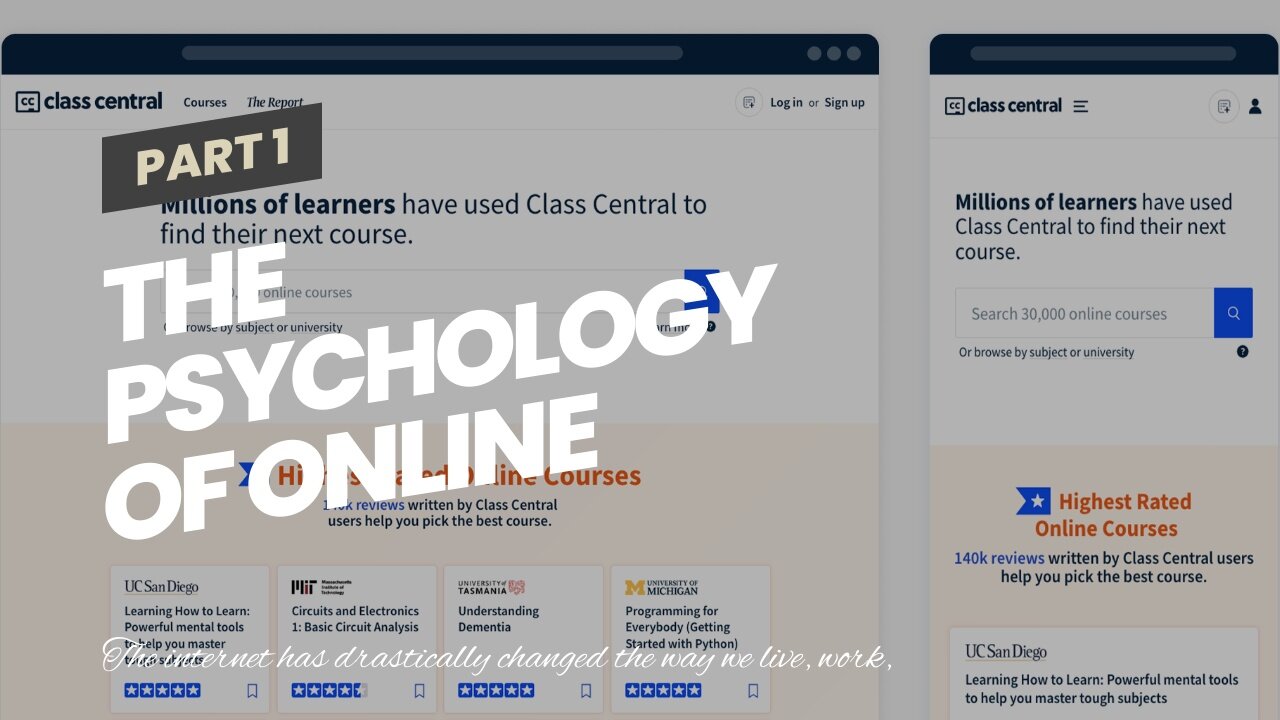Premium Only Content

The Psychology of Online Learning: How to Get the Most Out of Your Online Education.
The Psychology of Online Learning: How to Get the Most Out of Your Online Education.
The internet has drastically changed the way we live, work, and learn. Online learning has become a popular option for students of all ages, and with good reason. It’s flexible, affordable, and can be tailored to fit your unique needs and interests.But as with anything, there are both advantages and disadvantages to taking your education online. In this blog post, we’ll explore the psychology of online learning and provide tips on how to get the most out of your virtual education.Whether you’re considering taking an online course or are already enrolled in one, this post will give you insights into...
https://finetimer.site/the-psychology-of-online-learning-how-to-get-the-most-out-of-your-online-education/
The internet has drastically changed the way we live, work, and learn. Online learning has become a popular option for students of all ages, and with good reason. It’s flexible, affordable, and can be tailored to fit your unique needs and interests.But as with anything, there are both advantages and disadvantages to taking your education online. In this blog post, we’ll explore the psychology of online learning and provide tips on how to get the most out of your virtual education.Whether you’re considering taking an online course or are already enrolled in one, this post will give you insights into what to expect and how to make the most of your experience.
The Psychology of Online Learning.
What is online learning?
Online learning is a type of distance education that delivers educational content via the internet. It allows students to complete courses without attending physical classrooms.
The benefits of online learning.
There are many benefits of online learning, including increased flexibility, affordability, and convenience. Online learning can be a great option for busy adults who want to continue their education but cannot commit to traditional classroom schedules. Additionally, online courses often offer more affordable tuition rates than traditional colleges and universities.
The challenges of online learning.
While there are many advantages to taking courses online, there are also some challenges that students should be aware of before enrolling in an online program. These challenges include potential isolation from classmates, difficulty staying motivated, and technical difficulties with the course delivery platform.
How to Get the Most Out of Your Online Education
Choosing the right online course.
Choosing the right online course is critical to getting the most out of your online education. Not all courses are created equal, and it’s important to find one that fits your learning style and needs. Here are a few things to consider when choosing an online course:
-The subject matter: Make sure the course covers the topics you’re interested in and that you have a basic understanding of the material before enrolling.
-The format: Some courses are more lecture-based while others are more hands-on. Choose the format that works better for your learning style.
-The schedule: Online courses usually offer more flexibility than traditional courses, but there may still be due dates and deadlines you need to be aware of. Make sure you can commit the time needed to complete the coursework before enrolling.
-The cost: Be sure to compare tuition rates and consider any additional costs like books or software before making your decision.
Creating a study plan.
Once you’ve chosen the right online course, it’s time to create a study plan. A study plan will help you stay on track and make the most efficient use of your time. Here’s how to create a study plan for an online course:
1) Start by creating a timeline of when each assignment is due and when exams will take place. This will help you pace yourself and avoid getting overwhelmed.
2) Break down each assignment into smaller tasks that you can complete over time. This will help you stay focused and make progress on each assignment bit by bit.
3) Set aside specific times each week for studying, and stick to this schedule as much as possible. If you can’t find large blocks of time, try studying in shorter increments throughout the day.
4) Take advantage of resources like discussion boards, office hours, and tutoring services if they’re offered by your school or instructor. These can be extremely helpful when trying to understand difficult concepts or troubleshoot technical problems.
S...
-
 5:29
5:29
FineTimer
2 years agoThe Merit Circle: How to Join and Successfully Exist in this Competitive World
478 -
 4:23
4:23
Blackstone Griddles
15 hours agoEasy Salmon Dinner on the Blackstone Griddle
19.4K1 -
 8:10
8:10
WhaddoYouMeme
1 day ago $0.02 earnedChristians, Before You See “Testament”, Watch this!
2.34K3 -
 8:42
8:42
Freedom Frontline
13 hours agoDurbin’s Trump Smear Video Just HUMILIATED Him in the Senate
3.62K -
 10:56
10:56
ariellescarcella
11 hours agoThe Shocking Divide Among College Voters Sparks Worry For America
2.66K5 -
 13:09
13:09
Forrest Galante
10 hours agoWildlife Expert Reacts To Deadly Australian Animal TikToks
47K4 -
 12:08
12:08
Zoufry
2 days agoThe Mystery of Gaddafi's Final 24 Hours
8.67K11 -
 18:25
18:25
Liberty Hangout
13 days agoAnti-Ice Demonstrators Love Poop!
44.4K66 -
 9:39
9:39
MattMorseTV
16 hours ago $1.05 earnedVance just DROPPED a BOMBSHELL.
40.2K64 -
 23:47
23:47
GritsGG
1 day agoThe Forgotten Best Sniper Support AR!
15.5K3